Module 3
Lessons 4, 5, 6 and 7
Student’s Book pages 27, 28, 29, 30, 31 and 32
What is science fiction?
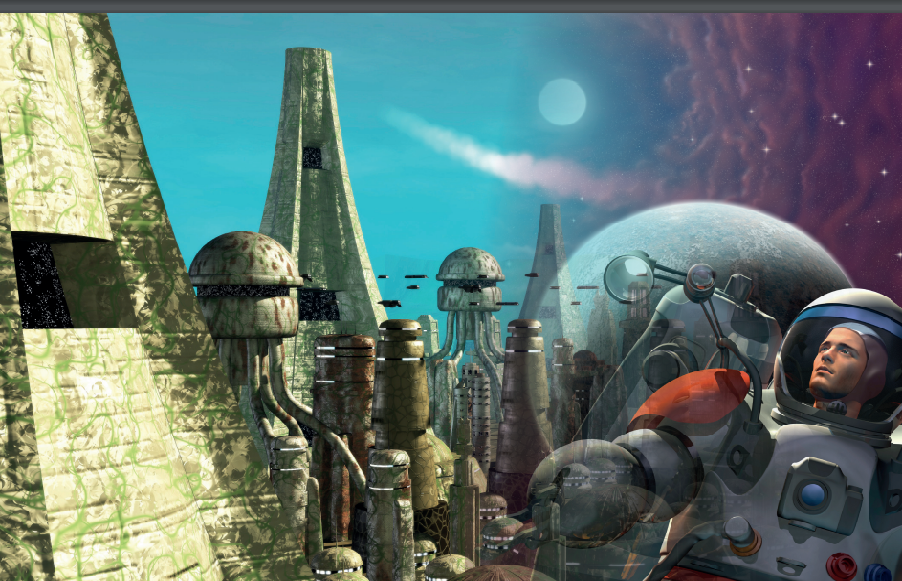
Before you start
Look at the pictures. What are they about? Have you ever read a story or watched a film about science fiction? What were they about?
Answers
Students’ own answers
1 Listen to the words below in context. Try to guess their meanings.
|
alternative, principle, accurate, advance, rationally, reality, science fiction, weightless |
Audioscript
1. Think about changing your mind – look at alternative ideas.
2. I live by the principle that all people should be nice to each other.
3. What an accurate guess! You got it right!
4. Advances in medicine mean that people will have healthier lives.
5. I didn’t think with my emotions. I thought rationally.
6. One day, flying cars will be a reality – we will actually be able to drive them!
7. I love reading good science fiction and feeling like I’m in the future.
8. In space, you float because you become weightless.
Find the words
- One of a number of things from which only one can be chosen.
- It is what actually happens in the world.
- Exactly right in every detail.
Answers
alternative; reality; accurate
READING
2 What do you know about science fiction? Answer these questions before reading the article.
1. What does a science fiction story talk about?
2. What elements make a good science fiction story?
3. Why do people write science fiction stories?
3 Now, scan the article and check your answers.
Answers
Students’ own answers
3 Now, scan the article and check your answers.
The science fiction story
Science fiction or “Sci Fi” deals rationally with alternative possibilities to our everyday reality. Sci Fi uses scientific theories, new scientific principles or new technologies as elements in the story.
A good science fiction story will include the following elements:
• A setting in the future, or in a historical past that is different from the history we know
• A setting in outer space including technology or scientific rules which contradict known scientific theories
There are many arguments about which story was the first science fiction story. However, science fiction as we know it today started with Jules Verne, who wrote exciting adventure stories including amazingly accurate predictions about future science. In From the Earth to the Moon, 100 years before the first Moon landing, he predicted that astronauts would be weightless in space! No one knew this at the time.
Why is science fiction so popular today? Is it just because the stories are exciting? Some people believe that it is popular because it is the literature of change. There have been many technological advances in the past few years, and it is natural for any culture to discuss these and future changes in stories. Some writers’ predictions come true, and it is thrilling to read examples of what our lives might be like.
Suggested answers
1. A science fiction story talks about the future and possible changes to the things we know.
2. A setting in the future, a setting in a historical past that is different from the history we know or a setting in outer space are elements that make a good science fiction story.
3. People write science fiction stories to discuss the future changes in cultures.
VOCABULARY
4 Find these words in the article and guess their meaning.
1. element (line 3)
a. one part of a whole work
b. an amount of something
c. a part in an electric teapot
2. setting (line 5)
a. music written to go with a poem
b. surroundings
c. the place and time when a story takes place
3. contradict (line 7)
a. go against known facts
b. agree with known facts
c. differ from known facts but not necessary false
4. thrilling (line 17)
a. boring
b. scary
c. very exciting
Answers
1. a; 2. c; 3. a; 4. c
What do you think?
Read the quotation. Translate it into Arabic.
“We're changing the world with technology.”
Bill Gates
It talks about the importance and impact of technology. Bill Gates (1955–) is an American programmer, inventor and businessman. He also has a lot of charities and helps the less fortunate. He believes that the world is changing through the inventions that are coming up.
5 What can you remember? Cover the text and correct these sentences.
1. Science fiction is about the changes that happened to the things we know.
2. People agree on which the first science fiction story as we know it today was.
3. Jules Verne mentioned in one of his books what other people had discovered, that astronauts would fl oat in space.
4. The things that science fiction writers predict will never happen.
Answers
1. Science fiction is about the possible changes that might happen to the things we know.
2. Nobody knows what the first science fiction story as we know it today is.
3. Jules Verne mentioned in one of his books what no one else knew about, that astronauts would float in space.
4. The things that science fiction writers predict might actually happen.
LISTENING
6 Listen to this lecturer and his students. Complete the sentences with the new information.
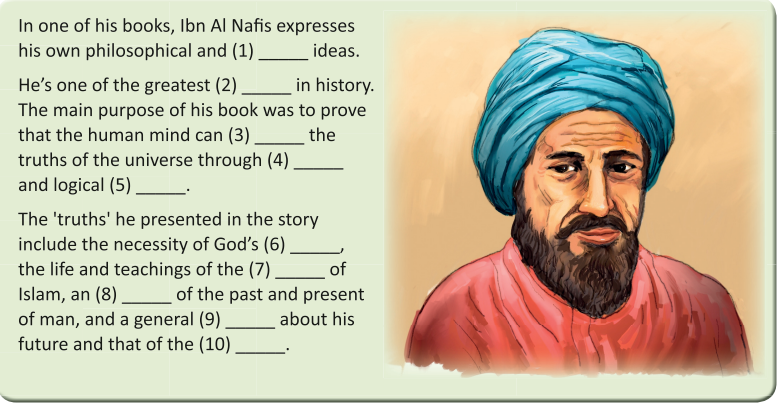
Audioscript
Teacher: So, it is clear that in one of his books, Ibn Al Nafis uses the plot to express his own philosophical and scientific ideas. In fact, he included references to his own theories in it.
Student A: So, he was really a scientist!
Teacher: Indeed. He’s one of the greatest doctors in history. He was the first who accurately described the circulation of blood through the lungs and the body. Three centuries later, the credit went to Michel Servet and later, to W. Harvey.
Student B: So, can we say that he wrote that book to explain his own theories about medicine?
Teacher: Not quite. He explained that the main purpose of his book was to prove that the human mind can deduce the truths of the universe through reasoning and logical thinking.
Student C: And what were these truths for Ibn Al Nafis?
Teacher: The “truths” presented in the story include the necessity of God’s existence, the life and teachings of the prophets of Islam, an analysis of the past and present of man and a general prediction about his future and that of the planet.
Answers
Students’ own answers
7 Now, listen again and check your answers.
Answers
1. scientific;
2. doctors;
3. deduce;
4. reasoning;
5. thinking;
6. existence;
7. prophets;
8. analysis;
9. prediction;
10. planet
WRITING
8 Write down three activities you are going to do and three events you think will happen in the next five days. Write your opinion: will they be interesting or uninteresting? Will you enjoy carrying out your plans or not? Use as many linking words as possible for coherence.
Answers
Students’ own answers
SPEAKING
9 In a group, discuss what you wrote. Do all of you have similar plans and predictions? Do all of you share the same opinion about the activities and events you mention in your notes? What are the similarities and differences?
Answers
Students’ own answers
Communication Workshop
Filling in an application form
Before you start
Have you ever filled in an application form? Have you ever applied for a job?
Answers
Students’ own answers
Application form
First name: Raed
Surname: Al Rasheed
Address: 251 Al Taj Street,
Amman Phone number:-------------------
Email address:-----------------------
Interests / Hobbies: reading science magazines, swimming, jogging
Write a short paragraph explaining your relevant experience, your reasons for applying and your expected contributions to the job.
I am applying for the vacancy of software programmer in your company. I worked in a computer company for three months as a research assistant. I am interested in the position in your company because it matches my field of specialisation: software programming. I feel I’ll have the opportunity to use my expertise in this field to contribute to your company by developing new programmes, and to develop my skills further.
Writing Strategies:
Filling in an application form
● When filling in an application form, it is necessary to use formal English.
● Do not use slang or abbreviations, and avoid using contractions, i.e., use ‘do not’ rather than ‘don’t’.
● Be clear and logical. On an application form, you should first say what job you are applying for, and then give further details.
1 Imagine you are applying to join the Science Club at school. In pairs, discuss what you are going to include in your application form. Answer the following questions.
1. What are your reasons for applying to join the club?
2. What experience do you have that is relevant to the club?
3. How will you contribute to the club?
Answers
Students’ own answers
2 In a group, make an application form for the Science Club. Use the form above as a guide. You may include any additional headings that you find necessary.
Answers
Students’ own answers
3 Read the Writing Strategies. Then, use your notes from exercise 1 to write the paragraph about yourself to include in the application form. When you finish, exchange your notebook with your partner to edit each other's paragraphs.
Answers
Students’ own answers
Language Development
1 Complete this text with the correct form of be going to or will.
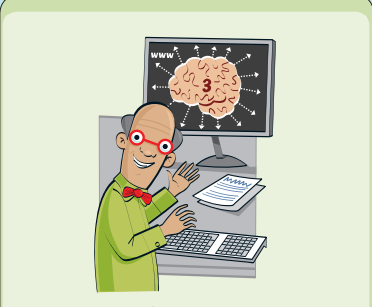
In the heart of Silicon Valley, people are working on a new type of Internet. It (1) _____ be more powerful than the one we have now.
Imagine you are typing an email. The Internet (2) _____ know its subject, and it (3) _____ suggest websites and books, as well as documents, photographs and videos you have saved that may be relevant to that topic. The new web (4) _____ become smarter than the previous ones. It will connect every aspect of our digital lives.
With Web 1.0, engineers wanted to make information accessible to everyone. With Web 2.0, users are able to connect with one another. Now, engineers are developing Web 3.0, which a lot of people already started using. This (5) _____ make the web much more intelligent. With Web 3.0 they (6) _____ give the Internet a "brain".
2 Now, listen and check your answers. In pairs, discuss your guesses.
Audioscript
In the heart of Silicon Valley, people are working on a new type of Internet. It will be more powerful than the one we have now. Imagine you are typing an email. The Internet will know its subject, and it will suggest websites and books, as well as documents, photographs and videos you have saved that may be relevant to that topic. The new web will become smarter than the previous ones. It will connect every aspect of our digital lives. With Web 1.0, engineers wanted to make information accessible to everyone. With Web 2.0, users are able to connect with one another. Now, engineers are developing Web 3.0. This is going to make the web much more intelligent. With Web 3.0 they are going to give the Internet a “brain”.
Answers
- will; 2. will; 3. will; 4. will; 5. is going to; 6. are going to
3 Use these words to ask questions and answer them.
1. people / Where / working / a / type / Internet? / are / on / new / of
2. connect / will / What / web / in the future? / the
3. Internet / What / will / the / know? / new
4. the / will / Internet / new / know / Why / this?
Answers
1. Where are people working on a new type of Internet? People are working on a new type of Internet in the heart of Silicon Valley.
2. What will the web connect in the future? It will connect every aspect of our digital lives.
3. What will the new Internet know? The new Internet will know its subject.
4. Why will the new Internet know this? The new web will become smarter than the previous ones.
4 In a group, say what your plans are for the holidays.
Example
My family and I aren’t going to go away for our holidays. My father is going to give me tennis lessons and my mother and sister are going to visit our grandparents.
Answers
Students’ own answers
5 Put the following words in the correct column.
|
web cam principle setting thrilling built-in download connect |
|
Computers |
Science fiction |
|
webcam built-in download connect |
principle setting thrilling |
Crossword Puzzle
Read the clues and write the words in the puzzle.
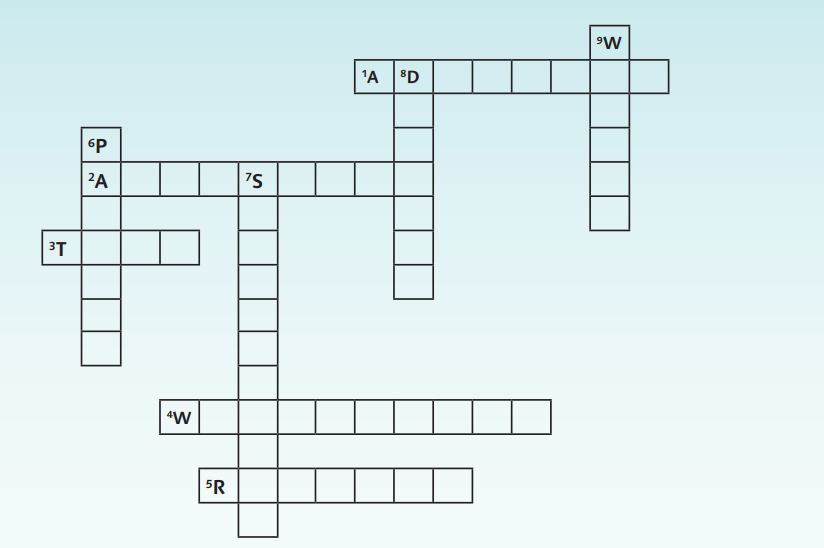
Across
1. Improvements done in any field of study
2. A person who helps others with their work
3. Very small in size
4. Something that is not affected by Earth’s gravity and has no weight
5. What is actually a fact or truth
Down
6. A person who is being treated by a doctor or in hospital
7. Trained and experienced in a specific field or activity
8. Far away in space or time
9. A video camera that sends out films on a website (or network)
Answers
Across
1. ADVANCES
2. ASSISTANT
3. TINY
4. WEIGHTLESS
5. REALITY
Down
6. PATIENT
7. SPECIALISED
8. DISTANT
9. WEBCAM
Research box
What’s the complete name of Ibn Al Nafis? What are his achievements and publications?
Answer
His complete name is Alaa Al Din Abu Al Hassan Ali Ibn Abi Hazm Al Qarshi Al Dimashqi. He published Theologus Autodidactus in which he explained about the human mind and how it can deduce the truths of the universe through reasoning and logical thinking.
Activity Book
Pages 21- 26
Second section
Grammar
The Future Simple
1 Underline the correct words to complete the text.
According to a survey of Internet experts, most people agree with predictions that in 30 years we (1) will / are going to become more dependent on computers. However, 42% of the people surveyed think that humans (2) will not / are not going to have the ability to control this technology.
Experts predict that some people (3) will / are going to choose to live without the network. They agree that English (4) will / is going to be a universal language for communication, but they also predict that other languages such as Arabic (5) will / are going to become as important.
When people were asked this question: (6) Will the world / Is the world going to be a better place in 30 years because of the Internet? 48% agreed and 52% disagreed.
2 Now, listen to the text and check your answers.
3 Answer the questions and make your own predictions about the future.
1. What do you think the weather will be like at the weekend?
2. What subjects will you do best this term?
3. What job do you think you will do one day?
4. Do you think you will ever live in another country? Which one, and why / why not?
5. What important things do you think will happen in the world in the next five years?
4 Complete the statements and questions. Use will/ won’t or is/are (not) going to.
1. A: Look! There’s smoke coming from the grass over there.
B: Someone has dropped a match. Quick, get some water. There……………………… be a fire!
2. A: This orchestra is really the best in the competition.
B: I agree. I think they……………………. win.
3. A: Do you think it…………………… be warm enough to go to the park tomorrow?
B: I don’t know, but I hope it…………………….. be windy. We have a picnic lunch!
5 Imagine you are in each of the situations below. Write sentences about what you are going to do.
I want to be a teacher. I’m going to study English literature at university.
1. My little brother is having a test tomorrow I’m …
2. I want to be a professional footballer I’m …
3. I’m hungry I’m …
4. It’s my mum’s birthday tomorrow I’m …
5. I’ve worked hard today I’m …
Vocabulary corner
6 Read the clues 1–7 and write the words in the puzzle. You are given the first letters.
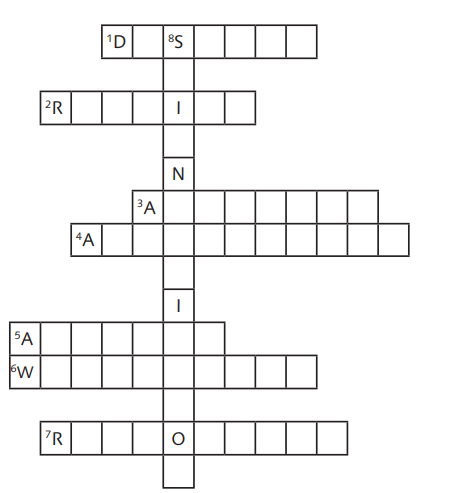
1. something far away in place or time
2. what is true and factual and not imaginary
3. something exact without any mistakes
4. something that could be a second possibility or a choice between two things
5. development made in any field of study
6. something that has no weight and is not affected by Earth’s gravity
7. in a logical manner of thinking
7 What is the word for number 8? Write its clue.
Third section
Communication
Roleplaying
1
|
Role A |
Role B |
|
You are a journalist and you are going to interview a famous scientist. The purpose of the interview is to know what he/ she imagines life will be like in 2050. In your notebook, write your questions and be ready to ask them. The words in the box below are some topic suggestions. |
You are a famous scientist. A journalist is going to interview you. His/Her purpose is to know what you think life will be like in 2050. In your notebook, write your opinions about the topics in the box and be ready to answer the questions. |
|
space travel a cure for all diseases computers mobile phones television books sports food poverty |
2 Choose the five topics that interest you most and write a sentence about each, explaining how they are going to change or will change in the future.
Fourth section
Focus on writing
Punctuation, apostrophes and short forms (Revision)
1 Write this newspaper column again in your notebook. Add apostrophes, capital letters, commas and full stops.
one day we wont need to wash our cars anymore well all have a car that washes itself it will have special machines in it that contain sensors ready to receive an order from the driver to start washing well just have to press one button for the soap and another for the water and the car will become clean and shiny in just a few minutes.
Spelling
2 Complete the words with the correct spelling.
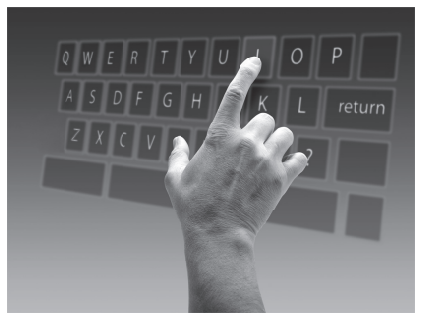
There are hopes that Jordan is going to be the capital of technology in the Middle East. In order to achieve this goal,
(1) sp_ci _ _ is _d companies are developing computer technology in schools all over the country. Computer labs will expand and more students in different schools will be able to (2) co_ne_t to the Internet.
The success of Jordan due to the technological (3) a _v _ _c_s it will have, will motivate other neighbouring countries to do the same. The future generation will also become highly skilled in using computers. Many people in Jordan believe that these methods or any other (4) a _t_ _n_t_v_ ways for developing computer technology will turn the hopes into a (5) r_a_i_y.
Linking words
3 Use the words in brackets to join these sentences.
1. In the future, our books will all be contained on one small hand-held screen. Our newspapers will all be contained on one small hand-held screen. (as well as)
In the future, our books as well as our newspapers will all be contained on one small hand-held screen.
2. Internet experts agree that in 30 years, the network will create new opportunities. Internet experts agree that in 30 years we will become more dependent on computers. (also)
3. Most people think that the world will be a better place in 30 years because of the Internet. Other people think completely the opposite. (However)
4. People agree that English will be a universal language for communication. They predict that other languages such as Arabic will become as important. (although)
Guided writing
4 Explain your plans after you’ve finished school. Use as well as, also, however and although to join your ideas.
Although I don’t like maths, I’m going to study physics as well as pure maths. I’m going to do this because I’m going to be an astronaut. However, ...
What I have learnt
1 Complete the conversation with the correct form of will/won’t or be going to and the verbs in brackets. (1 mark each)
Laila: Oh! It’s New Year again! Time to think about the things I (1)…………………… (change) in my life. I’ve got an idea. I (2)……………………. (write) a list. Nabila: Really! Every year you say you (3)………………………. (do) lots of things. I predict that you (4)………………………… (not do) any of them.
Laila: This time things will be different – you (5)……………………. (see)! I (6)……………………. (work) very hard again this year. By the end of the year, I (7)……………………….. (be) the top student. Then my parents and teachers (8)…………………… (be) very pleased with me.
Nabila: I know that (9)…………………………. (happen) because you always work hard. And I (10)……………………. (work) hard too.
Laila: Yes. Let’s both be top students!
2 Make statements or questions about the future using the words in brackets. (2 marks each)
1. We / have lunch at the café later. (be going to)
2. you think Fares / go to the library tomorrow? (will)
3. What / the weather be like at the weekend? (will)
4. Who / replace Mr Akel when he travels next week? (be going to)
5. At eight o’clock, he / have dinner with his family. (be going to)
3 Choose the correct answer. (2 marks each)
1. In 30 years, experts predict that there people who refuse to use the Internet.
a. are going to be
b. will be
c. is going to be
2. I English literature because I need a university degree to teach English.
a. ’m going to study
b. study
c. ’ll study
3. Computer technology people all around the world.
a. affect
b. is going to affect
c. will affect
4. You can’t make a video call unless you have a webcam in your laptop.
a. connect
b. built-in
c. download
5. The report you’re writing should be . Make sure you write the exact dates.
a. principle
b. accurate
c. alternative
Second section, pages 21- 22
1. 1. are going to 2. will not 3. will 4. is going to 5. will 6. Will the world
3. Example answers 1. I think the weather will be rainy at the weekend.
2. This term, I will do best in English and physics.
3. One day, I think I will become a doctor.
4. Yes, I do. I think Italy is a very interesting country because it has a lot of ancient monuments.
5. I think people will start driving cars that fly in the next five years.
4. 1. is going to
2. will
3. will/won’t/are going to
5. Students’ own answers
6. 1. DISTANT 2. REALITY 3. ACCURATE 4. ALTERNATIVE 5. ADVANCE 6. WEIGHTLESS 7. RATIONALLY
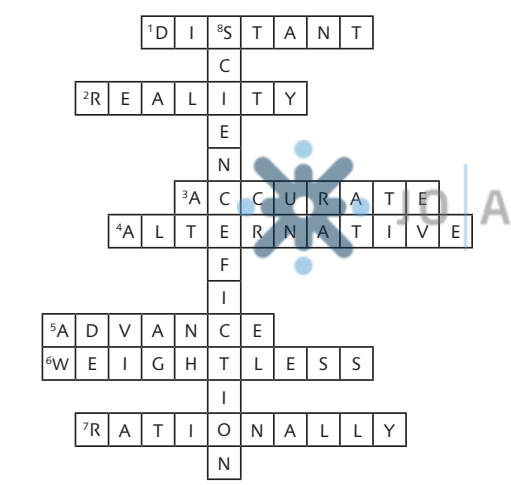
7. 8. SCIENCE FICTION: a story based on imagined future scientific or technological development
Third section, page 23
1. Students’ own answers
2. Students’ own answers
Fourth section, pages 24-25
1. One day, we won’t need to wash our cars anymore. We’ll all have a car that washes itself. It will have special machines in it that contain sensors ready to receive an order from the driver to start washing. We’ll just have to press one button for the soap and another for the water, and the car will become clean and shiny in just a few minutes.
2. 1. specialised 2. connect 3. advances 4. alternative 5. reality
3. 2. Internet experts agree that in 30 years, the network will create new opportunities, and that we will also become more dependent on computers.
3. Most people think that the world will be a better place in 30 years because of the Internet. However, other people think completely the opposite.
4. Although people agree that English will be a universal language for communication, they predict that other languages such as Arabic will become as important.
4. Students’ own answers
What I have learnt, page 26
1. 1. ’m/am going to change
2. ’m/am going to write
3. ’re/are going to do
4. won’t do
5. will see
6. ’m/am going to work
7. ’m/am going to be
8. will be
9. will happen
10. ’m/am going to work
2. 1. We are going to have lunch at the café later.
2. Do you think Fares will go to the library tomorrow?
3. What will the weather be like at the weekend?
4. Who is going to replace Mr Adel when he travels next week?
5. At eight o’clock, he is going to have dinner with his family.
3. 1. b 2. a 3. c 4. b 5. b